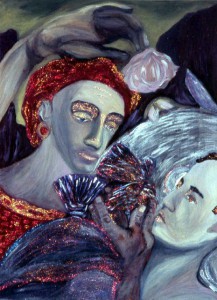7 The Goddess, cont’d
Sariputra: Goddess, what prevents you from transforming yourself out of your female state?
Goddess: Although I have sought my “female state” for these twelve years, I have not yet found it. Reverend Sariputra, if a magician were to incarnate a woman by magic, would you ask her, “What prevents you from transforming yourself out of your female state?”
Sariputra: No! Such a woman would not really exist, so what would there be to transform?
Goddess: Just so, reverend Sariputra, all things do not really exist. Now, would you think, “What prevents one whose nature is that of a magical incarnation from transforming herself out of her female state?”
Thereupon, the goddess employed her magical power to cause the elder Sariputra to appear in her form and to cause herself to appear in his form. Then the goddess, transformed into Sariputra, said to Sariputra, transformed into a goddess, “Reverend Sariputra, what prevents you from transforming yourself out of your female state?” And Sariputra, transformed into the goddess, replied, “I no longer appear in the form of a male! My body has changed into the body of a woman! I do not know what to transform!”
The goddess continued, “If the elder could again change out of the female state, then all women could also change out of their female states. All women appear in the form of women in just the same way as the elder appears in the form of a woman. While they are not women in reality, they appear in the form of women. With this in mind, the Buddha said, ‘In all things, there is neither male nor female.'” Then, the goddess released her magical power and each returned to his ordinary form. She then said to him, “Reverend Sariputra, what have you done with your female form?”
Sariputra: I neither made it nor did I change it.
Goddess: Just so, all things are neither made nor changed, and that they are not made and not changed, that is the teaching of the Buddha.
Sariputra: Goddess, where will you be born when you transmigrate after death?
Goddess: I will be born where all the magical incarnations of the Tathagata are born.
Sariputra: But the emanated incarnations of the Tathagata do not transmigrate nor are they born.
Goddess: All things and living beings are just the same; they do not transmigrate nor are they born!
Sariputra: Goddess, how soon will you attain the perfect enlightenment of Buddhahood?
Goddess: At such time as you, elder, become endowed once more with the qualities of an ordinary individual, then will I attain the perfect enlightenment of Buddhahood.
Sariputra: Goddess, it is impossible that I should become endowed once more with the qualities of an ordinary individual.
Goddess: Just so, reverend Sariputra, it is impossible that I should attain the perfect enlightenment of Buddhahood! Why? Because perfect enlightenment stands upon the impossible. Because it is impossible, no one attains the perfect enlightenment of Buddhahood.
Sariputra: But the Tathagata has declared: “The Tathagatas, who are as numerous as the sands of the Ganges, have attained perfect Buddhahood, are attaining perfect Buddhahood, and will go on attaining perfect Buddhahood.”
Goddess: Reverend Sariputra, the expression, “the Buddhas of the past, present and future,” is a conventional expression made up of a certain number of syllables. The Buddhas are neither past, nor present, nor future. Their enlightenment transcends the three times! But tell me, elder, have you attained sainthood?
Sariputra: It is attained, because there is no attainment.
Goddess: Just so, there is perfect enlightenment because there is no attainment of perfect enlightenment.
Then the Licchavi Vimalakirti said to the venerable elder Sariputra, “Reverend Sariputra, this goddess has already served ninety-two million billion Buddhas. She plays with the superknowledges. She has truly succeeded in all her vows. She has gained the tolerance of the birthlessness of things. She has actually attained irreversibility. She can live wherever she wishes on the strength of her vow to develop living beings.”
Apparently distraught over this devī’s remarkable grasp of the Buddhadharma,Śāriputra resorts to what we would consider a chauvinistic, last-stand ploy: “So, what prevents you from shunning your female form?” In his Patristic mindset (one still held in many patristic quarters), he just could not conceive how the Buddhadharma could possibly be conveyed under the guise of a woman. She responds magnificently, “Hmmm, don’t know—haven’t lately been able to find my feminine-form.” What is this thing called woman? Once again, she shows her superior Buddha-gnosis. Then she really spins the ultimate insult…if he’s so-stuck on form, how-bout this? Śāriputra suddenly finds himself transformed into the devī and vice-versa. When asked to transform out of his/her lowly form, he/she freaks-out—“I really don’t know what do without my maleness.” The devī then really rubs-it-in, “If you could change form…anybody could.” This may lead one to speculate, was this sutra written by a woman? Then again, this truly reveals how the Bodhi-Spirit is neither male nor female (reminiscent of Jesus’ admonition, In Christ there is no east or west…male or female). At the very least, it was composed by a Spirit with a voracious appetite for humor. As the chapter concludes, we find that Śāriputra is still hung-up on this “attainment-thing”; the devī puts the final quell on his ineptitude, “It is the same with the power of Bodhi-it is attainable because there is nothing to attain.” Interesting how Vimalakriti speaks-up at the end of this whole encounter between Śāriputra and the devī—he gets him aside and more or less says, “Look, friend, you really don’t know who you were dealing with, do you? This devī has been in the service of an infinitesimal number of Buddhas—she knows the ropes; in fact, she’s been playing with you—she’s come face to face with deathlessness and is perfumed with IT’s markless mark. She can now do as she pleases—her own Bodhi-gnosis is complete and unexcelled.”

